10 lawmakers to watch as impeachment inquiry shifts to Judiciary Committee
When impeachment proceedings begin this week in a new venue — the House Judiciary Committee — they won’t necessarily be a sober-minded moment in American history focused strictly on substance for many of the committee members.
Instead, it’ll be brand-building time.
In contrast to 20 years ago, the last time a president was impeached, the importance of a politician’s personal brand has become an all-important form of currency and power for today’s member of Congress.
In an age of social media, small-dollar donors and super-PACs, the rules of politics — and the incentives that drive the behavior of lawmakers — are much different than they were in 1998. These new rules and incentives will shape the actions of those who take center stage in the impeachment drama.
The rules: Fend for yourself. There is no longer an elite political establishment that can protect incumbents who make principled but unpopular decisions. The power once held by party bosses now belongs almost entirely to primary voters.
“The party [primary] voters have taken away the independence of members,” former Rep. Barney Frank, a Massachusetts Democrat who was on the Judiciary Committee in 1998, told Yahoo News.
The style: Loud, brash and outrageous. That gets you more attention on cable TV — because cable networks want the viewers that provocateurs attract — more social media followers and more small-dollar donors.
“One thing that’s different from 20 years ago is that members who are outrageous can do fundraising off their outrage,” said Rep. Zoe Lofgren, D-Calif., who was a House Judiciary staffer in 1974 during the impeachment investigation into President Richard Nixon and is one of the four members of Congress who served on Judiciary in 1998, when the House impeached Bill Clinton, and is still on the committee.
In fact, last month we witnessed the cycle of outrage fueling media exposure during the first round of impeachment hearings when Rep. Elise Stefanik, a 35-year-old New York Republican, went from a total unknown to a star overnight.

Stefanik’s antics — pretending not to know the rules of the hearing and forcing Intelligence Committee Chairman Adam Schiff, D-Calif., to gavel her down — were not necessary for most ambitious young politicians until the last decade or two. Stefanik then could have climbed her way up the ladder, worked on some big legislation, and maybe taken some controversial stands if she wanted to force those in leadership to take notice.
Now, whatever gets you into the spotlight seems to be acceptable. Stefanik’s Twitter following has gone from the tens of thousands just weeks ago to several hundred thousand spread over two accounts. And she raised $500,000 in two hours from online donations after one of the hearings (though her Democratic challenger raised $1 million over three days in response).
Bob Inglis was a Republican congressman from South Carolina who served on the Judiciary Committee in 1998 and left Congress in 2010 after losing a primary challenge. He told Yahoo News that the difference between the Clinton impeachment and the Trump impeachment is that the GOP has been overtaken by a “slavishness to the base,” meaning those who vote in primary elections.
“Attendant to that is a lack of courage,” Inglis said in an interview. “Everyone is afraid to step out of line, because everyone else is accommodating. Politicians are afraid of the people they represent but they are terrified by the activists, because those are the people who will take you out in a primary.”
Another factor at play is the venue for this week’s political showdown. Judiciary is a larger committee than Intelligence, and is known for being more free-wheeling. Members of Congress who want publicity are more likely to end up on Judiciary than Intelligence, which conducts much of its business behind closed doors due to the sensitive nature of national security secrets it often deals with.
All of that is part of why House Speaker Nancy Pelosi, D-Calif., shifted the Ukraine investigation to Intelligence rather than conducting the initial witness testimony hearings in Judiciary, where much of the House hearings on Russian interference in the 2016 election and whether the Trump campaign colluded with the Russians took place.
Judiciary Chairman Jerry Nadler, D-N.Y., was on the committee as a rank-and-file member in 1998, but now as its chairman, his primary task will be to keep things from getting out of hand and making the Democrats’ impeachment inquiry look ridiculous.
“We’re just going to have to hope that all members of the committee — because Democrats are not without fault — conduct themselves with dignity and avoid the temptation to act out,” Lofgren said in an interview.
With these new dynamics in mind, here’s a look at the members of the House Judiciary Committee who are most likely to work their way into the public eye.
Rep. Matt Gaetz, R-Fla.
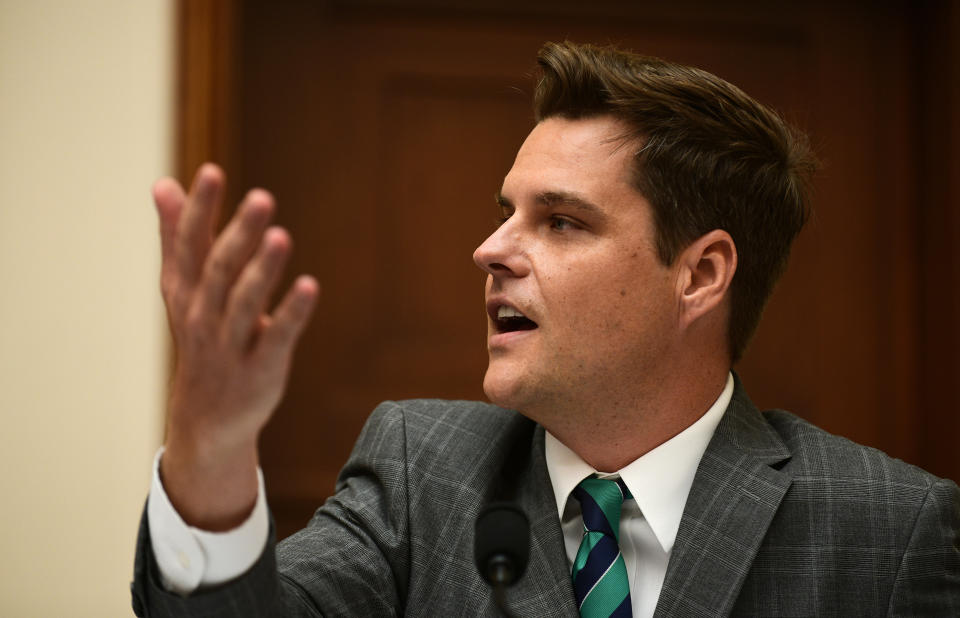
Of all the appetites for attention in Congress, this 37-year-old Florida Republican may just have the biggest. A year ago he made loud declarations, without evidence, that voting officials in one Florida county had committed election fraud and were making a “road map” to “steal” the 2020 election.
Then, in October, Gaetz led a group of 50 or so House Republicans who walked uninvited into a closed-door deposition with one of the impeachment investigation witnesses. The premise of the protest was that Democrats were conducting “secret interviews.” But this was a falsehood, since over 100 members of Congress across three different committees — nearly half of them Republicans — were able to attend the closed-door depositions.
Lofgren told Yahoo News that Gaetz has been referred to the House Ethics Committee for that stunt, which he conducted with the second-ranking Republican — House Minority Whip Steve Scalise of Louisiana — standing by his side. “There may be ramifications for members who act in violation of the rules,” Lofgren said.
But it’s unclear that a formal rebuke would matter to Gaetz, who represents the Florida Panhandle and has made a career of thumbing his nose at conventions. Elected just 18 months ago, he has a knack for using Congress as a platform to promote himself as an outsider. What’s unclear is whether anything of substance can be accomplished with such tactics.
Rep. Jim Jordan, R-Ohio
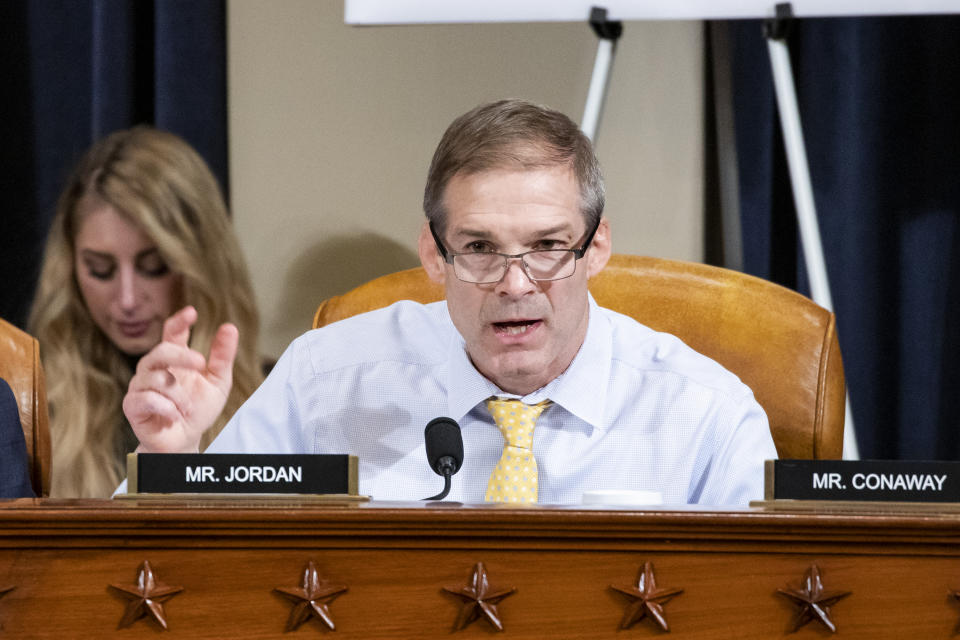
Jordan, 55, has been a politician for 25 years, spending a decade in the Ohio Legislature before being elected to Congress in 2006. He has had his eye on the top rungs of leadership in the House for a few years, running for speaker in 2018 after Paul Ryan announced his resignation, but lost the intra-party competition to now-House Minority Leader Kevin McCarthy, R-Calif.
Still, the energy in the GOP during the Trump era favors politicians like Jordan more than it does those like McCarthy, who built up favor with other lawmakers for years by helping to raise money for them and building relationships. Jordan, by contrast, is always in pit bull mode, approaching politics the same way he did competitors as a college wrestler, where he was a two-time national champion at the University of Wisconsin.
Jordan has already played a major role in the impeachment fight, after McCarthy moved him into a slot on the Intelligence Committee for the witness hearings. Jordan led the Republican effort, coordinating talking points and playing the role of chief press spokesman for his party. During the hearings, Jordan often made loud speeches in the form of a question, providing sound bites for Fox News and other conservative media outlets. That’s likely to continue when Jordan resumes his role on Judiciary.
Rep. Eric Swalwell, D-Calif.
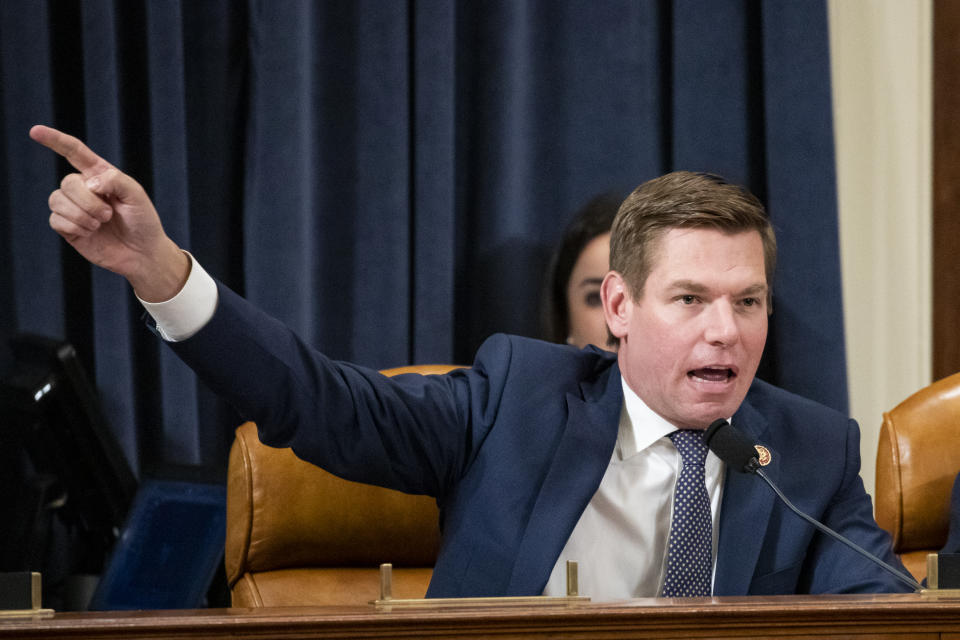
Swalwell, a 39-year-old who represents one of California’s wealthiest districts, the 15th, launched a quixotic campaign for president in April that he ended just three months later. But even if the candidacy was doomed from the start, it raised his profile. Swalwell was inspired to run for Congress after the 9/11 attacks, but like many younger politicians, he understands how the “attention economy” works.
A few years ago, Swalwell was dubbed the “Snapchat King of Congress” based on his adoption and frequent use of the social media platform. And in one of the few presidential debates Swalwell participated in, he went out of his way to attack Joe Biden for being past his prime, urging Biden to “pass the torch” to the next generation.
In addition to sitting on the Judiciary Committee, Swalwell is a permanent member of the Intelligence Committee, so he too will be a familiar face to those who watched the witness hearings. Swalwell generally refrained from histrionics during those two weeks, but he was quick to engage in confrontations with Republicans on the committee at certain points, serving as something of an enforcer for Schiff, the Intelligence chairman.
Rep. Andy Biggs, R-Ariz.
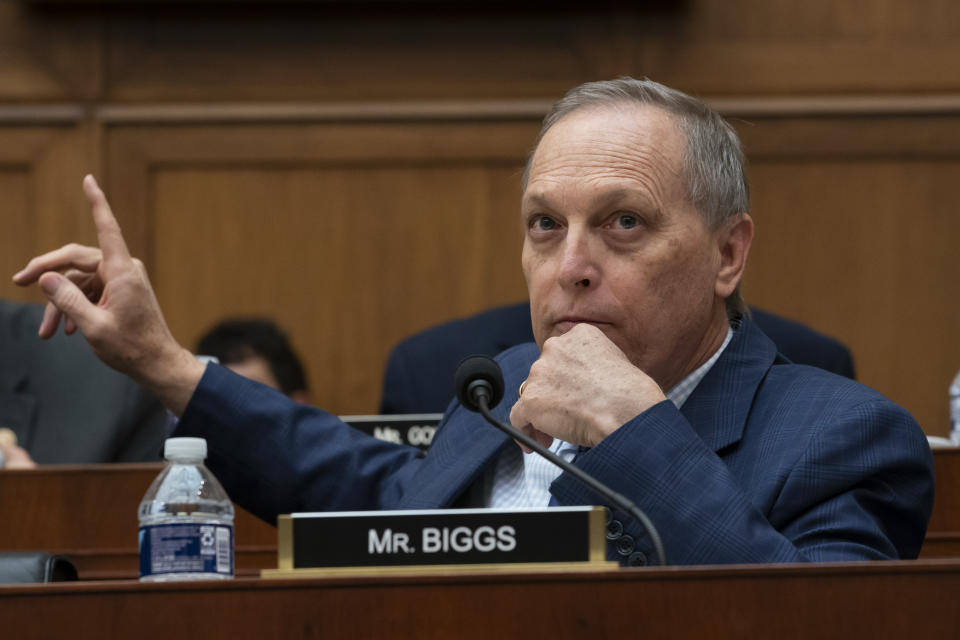
Biggs, 60, is a newcomer to Congress but is no stranger to being a legislator. He was elected to the House in 2016, but was in the Arizona Legislature from 2003 until then, and was president of the state Senate from 2013 to 2017. He became independently wealthy in the mid-1990s, when he won $10 million from Publisher’s Clearinghouse.
Biggs doesn’t have a big public profile, but this past October he was handed the role of chairing the House Freedom Caucus. That’s the group of the 30 or so most conservative or hard-line Republicans, which was founded in 2015 by Jordan, many of whose members participated in the October protest that occupied the congressional secure room, or SCIF.
On a Judiciary Committee with 41 members, and packed with other media-savvy, TV-friendly faces, Biggs may struggle to stand out.
Rep. Doug Collins, R-Ga.
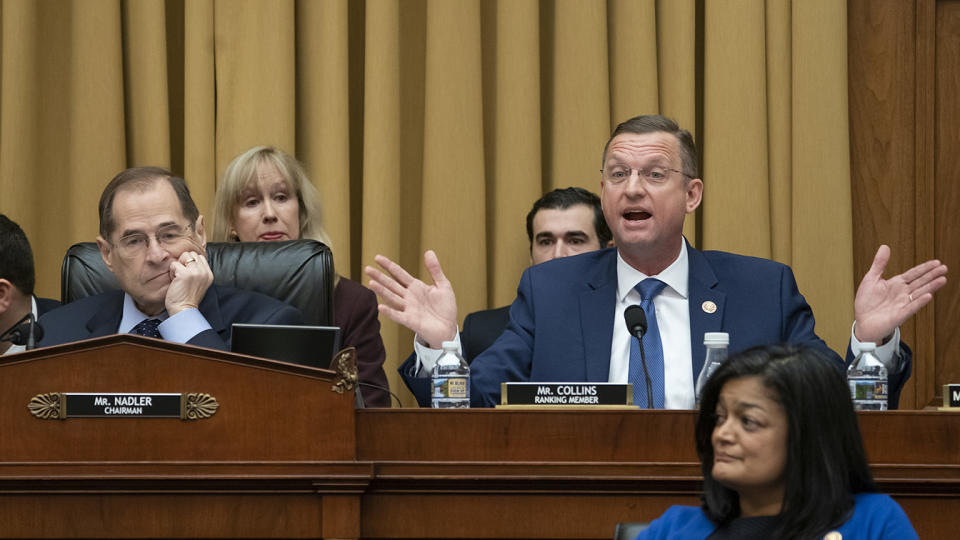
Collins is the ranking member on the Judiciary Committee, a position used by Rep. Devin Nunes, R-Calif., to promote his open disdain for the public impeachment hearings that took place last month. During an interview with Fox News on Sunday, Collins said that the Judiciary’s first witness should be Schiff and that there was “nothing problematic” about Trump conditioning the Ukrainian military aid. Collins also said that the president was right to push for an investigation into Hunter Biden because “other witnesses” said it needed to be looked at even though no one who testified did so. The appearance earned praise from Trump in a Monday afternoon tweet: “Great job by @RepDougCollins of Georgia over the weekend in representing the Republican Party, and myself, against the Impeachment Hoax!”
Collins is also angling for a U.S. Senate seat in 2020 and vociferous support of Trump could help in that pursuit. When Sen. Johnny Isakson announced his retirement earlier this year, Collins lobbied Republican Gov. Brian Kemp, for the position. Kemp, however, is expected to appoint businesswoman Kelly Loeffler to the seat.
Rep. Debbie Lesko, R-Ariz.

Lesko is serving her first full term as a congresswoman following a special election victory in April 2018. The former state legislator called the first public impeachment hearing “kind of boring” and said the process didn’t seem politically smart to her. One thing to watch for is whether Lesko raises the issue of a debunked conspiracy pushed by the president that the cybersecurity firm CrowdStrike was potentially involved with covering up a hack of the Democratic National Committee by Ukraine. During an October hearing on election security, Lesko asked about the investigation into the hack despite multiple reports finding that Russia was responsible.
“It has been reported that the FBI never obtained the original servers from the Democratic National Committee that had allegedly been hacked by Russia, instead relying on imaged copies,” Lesko said, alluding to the conspiracy. “Is that correct?”
Adam Hickey, a deputy assistant attorney general for the Justice Department’s National Security Division, quickly confirmed CrowdStrike’s account. Over the course of the Judiciary hearings, we will find out if that answer satisfies Lesko and the other Republicans on the panel or if they’ll continue to push that narrative.
Rep. Pramila Jayapal, D-Wash.

The two-term congresswoman has quickly risen in the ranks of the Democratic Party, serving as co-chair of the Progressive Caucus, working as a mediator between the divided wings of the caucus and emerging as the House’s foremost supporter of Medicare for All legislation. She’s supported impeachment for months, dating back to the May release of former special counsel Robert Mueller’s report. In September, she told the Seattle Times that there didn’t even need to be an investigation since Trump’s abuse of power was acknowledged by the man himself.
“The crimes have been committed in clear daylight. People should stop looking for a secret smoking gun. Donald Trump is the smoking gun,” said Jayapal, adding, “The president has publicly admitted to having a conversation with a foreign leader and telling him he wants an investigation against a political opponent.”
Rep. John Ratcliffe, R-Texas

Like Swalwell, Ratcliffe is a permanent Judiciary member who also serves on the Intelligence Committee and took part in the public impeachment hearings. This summer, Ratcliffe was nominated by Trump to serve as his director of national intelligence, but the three-term congressman withdrew over allegations he had made false claims on his résumé and over claims he was disengaged from his duties on the Intelligence Committee. The brief DNI nomination came after Ratcliffe verbally attacked Robert Mueller during a July hearing over his handling of his investigation into Russian interference of the 2016 election.
During last month’s impeachment hearings, Ratcliffe maintained his position as a staunch defender of the president, with colleagues repeatedly deferring their time to him to ask additional questions. Ratcliffe’s outspoken defense of Trump comes after his district in the northeastern region of the state was won by the president by 53.2 points in 2016.
Rep. Val Demings, D-Fla.

The former police chief of Orlando, Fla,, Demings is the final member of Congress who serves on both the Intelligence and Judiciary Committees. She has already said that the evidence of Trump’s wrongdoing is “clear and convincing.” During an interview with ABC News on Sunday, Demings said she is “certainly hoping” that Trump’s counsel will participate in the hearings and said, “If he has not done anything wrong, we’re certainly anxious to hear his explanation of that.” She also told ABC News that Democrats wouldn’t allow the process to be stalled by waiting for courts to decide whether White House personnel like former counsel Don McGahn would have to testify.
“We're not going to play games with them. The American people are not going to, I think, tolerate any games,” said Demings.
She has been openly critical of her committee members across the aisle for their handling of their inquiry.
“It has been baffling to me to watch my Republican colleagues totally disregard, totally ignore evidence that is pretty overwhelming, evidence that is pretty convincing about the president’s wrongdoing,” Demings said in a November interview on MSNBC’s “Morning Joe.” “The only excuse that I can come up with is that they are afraid to death of the president of the United States, which is really pretty disgraceful.”
Rep. Louie Gohmert, R-Texas
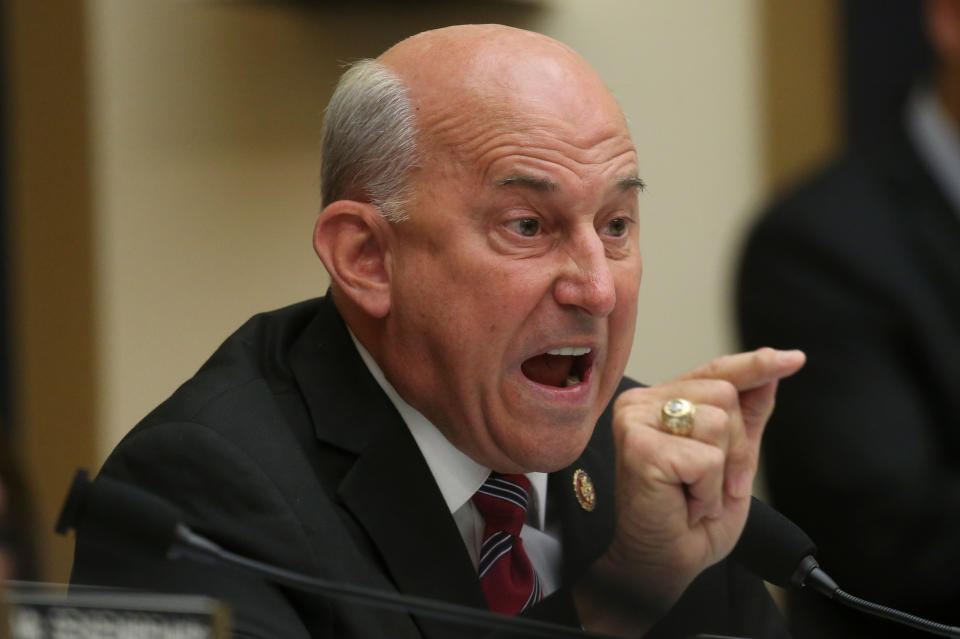
Gohmert has served in Congress since 2005 and is no stranger to controversy or to Fox News appearances. During July’s House Judiciary hearing with Robert Mueller, who Gohmert had previously referred to as an “anal opening,” the Texan went on a rant in which he accused the former FBI director of perpetuating injustice.
“And if somebody knows they did not conspire with anybody from Russia to affect the election and they see the big Justice Department with people that hate that person coming after them and then a special counsel appointed who hires a dozen or more people that hate that person, and he knows he’s innocent, he’s not corruptly acting in order to see that justice is done,” said Gohmert. “What he’s doing is not obstructing justice, he is pursuing justice — and the fact that you ran it out two years means you perpetuated injustice.”
“I take your question,” replied Mueller.
Gohmert also wrote an op-ed for Fox News host Sean Hannity’s website entitled “Robert Mueller: Unmasked,” which he entered into the congressional record. In a 2018 hearing with FBI agent Peter Strzok, Gohmert was condemned by his colleagues for criticizing Strzok’s marriage to suggest he might be lying under oath, which caused Rep. Bonnie Watson Coleman, D-N.J., to remark, “You need your medication.”
_____
Download the Yahoo News app to customize your experience.
Read more from Yahoo News:



